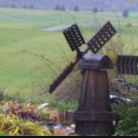
When faced with various difficulties, we can remind ourselves that “…the Lord is faithful, and He will strengthen and protect [us] from the evil one.” (II Thessalonians 3:3 NIV) How often don’t I need to remind myself to look to God, to seek His guidance first? I am so prone to wanting to “do it myself,” as a little child is apt to say. How independent and stubborn I am… we are! But then, lest we forget, “If we confess our sins, he is faithful and just and will forgive us our sins and purify us from all unrighteousness.” (I John 1:9NIV) Our God has a short memory of our failings when we unburden our hearts to Him in prayer and repentance.
I also like Psalm 89:1 which says, “I will sing of the Lord’s great love forever…” To praise our God in song and the written word for all He has done for us is to share His faithfulness with those around us. Like a mother hen, who we can visualize protecting her young chicks with her wings, David penned, “He will cover you with his feathers, and under his wings you will find refuge; his faithfulness will be your shield and rampart.” Such comfort there is to be found in the Psalms.
Every day our loving God stands with open arms ready to show us His love and compassion anew. “Because of the Lord’s great love we are not consumed, for his compassions never fail. They are new every morning; great is your faithfulness. I say to myself, ‘The Lord is my portion; therefore I will wait for Him.’” (Lamentations 3:22-24NIV) Oh, to be patient and wait for God’s answer to our prayers. He wants to bless us! But it also means His will may not be what we want. It requires patience and prayer from us as we wait for His answer, His blessing… as he sometimes takes us through a difficult time before we see the good come out of that circumstance.
For He is faithful and just, full of mercy and grace, and will meet us where we are. We are each uniquely created by Him, the One who knows exactly who we are, and who knows how best to meet our needs. Then, as we wait on Him, we can “Enter his gates with thanksgiving and his courts with praise; give thanks to him and praise his name. For the Lord is good and his love endures forever; his faithfulness continues through all generations.” (Psalm 100:4-5 NIV)
May you know His blessings as you experience the faithfulness of God in your life!
A Faithful God…
Linda A. Roorda
A faithful God…
Who loves me dear and draws me near
Who speaks to me in ways I can see
Who knows my heart and helps me live my part
Who hears my cry and knows how hard I try
Who holds me tight in His arms of might
Who forgives my sin on confession to Him
Who stands me tall when again I fall
Who deserves my praise in songs I raise
Who never lets go as the way He doth show
Who carries me through a trial and loves me all the while?
A faithful God...
~~
- Read more...
- 0 comments
- 298 views

